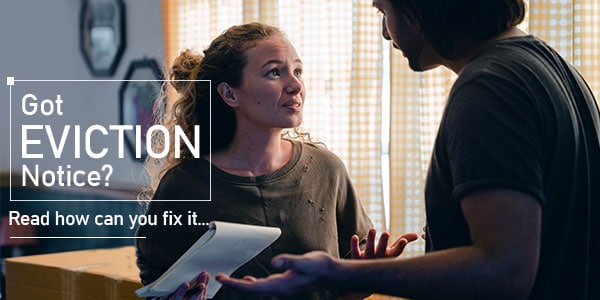A large number of people think that if they file bankruptcy, their landlord can evict them. This fear is common, but in reality, the automatic stay protection stops any sort of collection attempts and provide protection from eviction as well.
Here are some important facts that you should know about eviction in bankruptcy.
When a landlord can evict you during bankruptcy?
To evict you, your landlord needs to file and win a court case. You will get a copy of this action and need to respond to it. Once you respond to the notice, you will be provided a trial date. On trial day, your landlord needs to prove the case against you. If he wins, then your landlord can evict you. Thus, a landlord can’t evict a tenant without any judgment.
How can you avoid eviction during bankruptcy?
As you know, to evict you, your landlord needs to win a judgment for possession before you file for bankruptcy. So, you need to file bankruptcy before your landlord intimates the courts. Once you file bankruptcy, the automatic stay stops your landlord from processing an eviction.
How does the automatic stay protect the tenant from being evicted?
The automatic stay stops collection actions by creditors once the debtor files bankruptcy. The automatic stay also prohibits the landlord to start the eviction process. To evict, the landlord needs to obtain an eviction judgment. That means, if you have filed bankruptcy and you are behind on rent, your landlord cannot evict you from the residential lease.
What can a landlord do to lift the automatic stay?
The automatic stay stops the eviction, but the stay can be lifted. Here’s how:
- To lift the automatic stay, the landlord needs to file a motion requesting the bankruptcy court for permission to initiate the eviction. The tenant needs to provide proper reasons for why the eviction shouldn’t be initiated. Otherwise, the court can grant the landlord’s request and can lift the stay.
- If the landlord proves that the tenant is using illegal drugs on the premises or that the property is at stake, then the automatic stay will not be applied. Most likely, the landlord will be successful in initiating the eviction process.
The tenant can stay in the property even after the landlord gets an eviction judgment.
In some states in the USA, the tenant who has filed bankruptcy but got evicted by the landlord can stay in the property on a rent rearrange basis. However, the tenant has to follow some criteria when filing bankruptcy.
- The tenant needs to file a certification.
- The tenant needs to deposit the due rent in the next 30 days within 30 days from filing bankruptcy.
- The tenant needs to serve the certification to the landlord and file a second certification. The tenant has to mention that he has paid the past due rent in the certification.
How can a tenant avoid an eviction?
Though filing bankruptcy can stop an eviction as the automatic stay prohibits any action against the debtor, but this is not a permanent eviction solution. The landlord can still file a motion to lift the automatic stay. If the tenant is behind the rent, then the landlord can take legal action against the tenant.
Thus it is advisable to contact the landlord to make a payment arrangement or make an agreement about the stay or rent rearrangements.
What can a tenant do to clear an eviction?
To clear an eviction as you have filed bankruptcy, you can talk with your landlord. Your landlord needs to get the payments paid soon. If you can’t repay it, then request your landlord to make some rearrangement. By doing this, you can clear an eviction.
However, bankruptcy is a critical subject. You may not be able to understand which chapter is good for you. It can be chapter 7 or chapter 13. Thus, it is advisable to consult with an attorney to get the best assistance.









